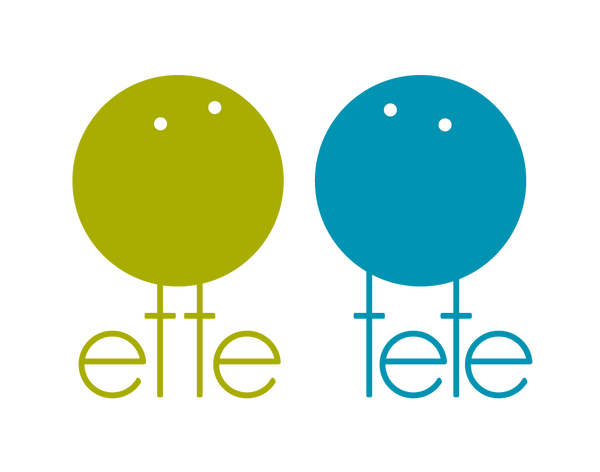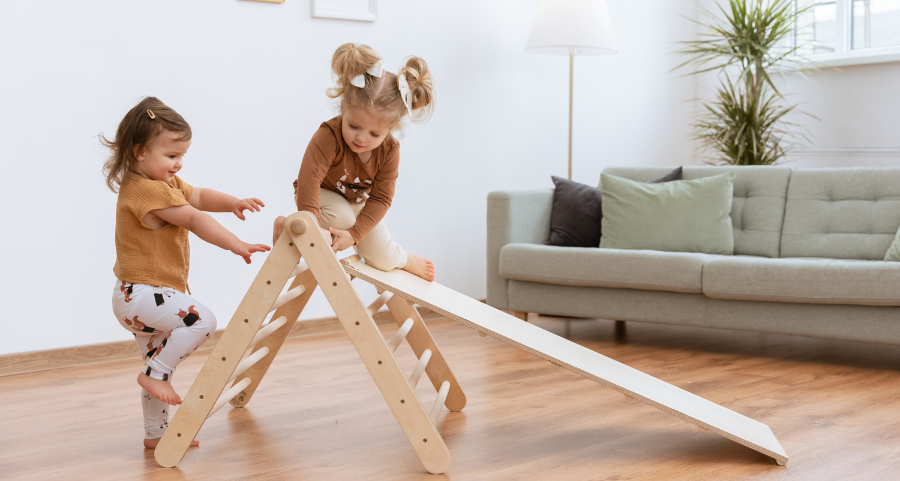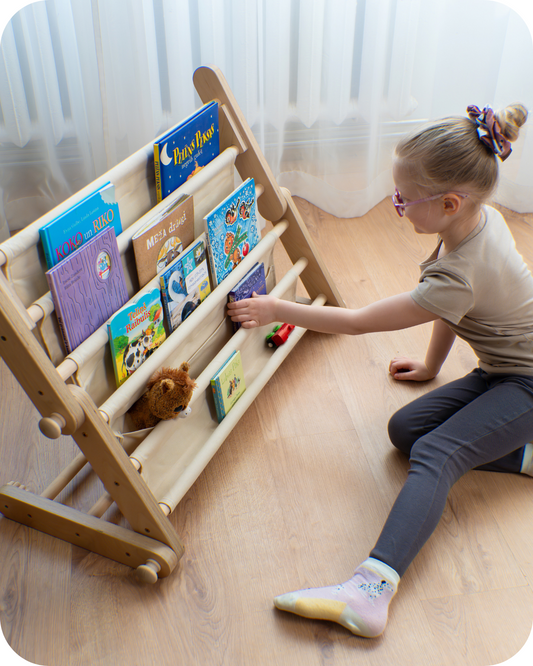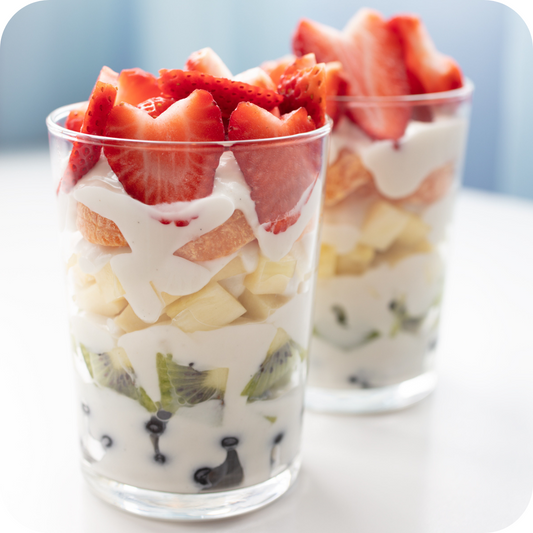At Ette Tete, we believe that play is an essential part of childhood, and toys serve as the keys that unlock a world of imagination, growth, and learning for your little ones.
As parents, we play a crucial role in selecting toys that promote your child's development. In this article, we will delve into the benefits of toys and how they influence various aspects of your child's growth, including brain development. Additionally, we will explore the world of activity toys inspired by natural development that we create at Ette Tete, such as climbing and balance toys.
Why Children Need Toys
Let’s start with the basics. Toys are not just objects for entertainment; they play a vital role in your child's development. Here's why children need toys.

Stimulating Imagination and Creativity:
Toys provide an avenue for children to explore their imagination, create narratives, and engage in pretend play. They become superheroes, doctors, chefs, and inventors, enhancing their creative thinking and problem-solving skills.
Through play, children can develop storytelling abilities, learn to think outside the box, and express their unique ideas.
Encouraging Social and Emotional Development:
Playing with toys allows children to learn important social skills, such as sharing, taking turns, and cooperating with others. It also provides an outlet for emotional expression, as they learn to express their feelings through play.
Through interaction with toys and peers, children develop empathy, learn to navigate social situations, and build lasting friendships.
Enhancing Cognitive Skills:
Toys stimulate cognitive development by promoting critical thinking, problem-solving, and decision-making abilities. They encourage children to explore cause and effect relationships, develop spatial awareness, and engage in logical reasoning.
Building blocks, puzzles, and construction sets, for example, challenge children to think strategically, plan, and solve problems. These activities contribute to the development of important cognitive skills that will benefit them throughout life.
How Toys Affect Brain Development
Toys have a profound impact on your child's brain development. Here's how they influence different aspects of cognitive growth:

Sensory Stimulation:
Toys with various textures, shapes, colors, and sounds engage your child's senses, promoting neural connections and enhancing sensory processing skills.
Soft toys with different textures provide tactile stimulation, while toys with vibrant colors and contrasting patterns enhance visual development.
Musical toys and rattles stimulate auditory senses, while objects that can be manipulated and squeezed promote motor skills development.
Fine and Gross Motor Skills:
Toys that require manipulation, such as building blocks or puzzles, strengthen your child's fine motor skills. By grasping, stacking, and manipulating objects, they develop hand-eye coordination and dexterity.
Activity toys like climbing frames and balance beams promote gross motor skills, coordination, and balance. These toys encourage children to climb, balance, and engage in physical activities that enhance their overall motor skills development and help to maintain focus and challenge new goals to achieve.
Language and Communication:
Toys that encourage conversation and storytelling, such as dolls or puppets, foster language development, vocabulary expansion, and communication skills.

Through imaginative play, children have the opportunity to create dialogue, engage in role-play scenarios, and express themselves verbally.
Board games and interactive toys that prompt conversation and interaction with others can further enhance language skills, turn-taking, and active listening.
Problem-Solving and Logical Thinking:
Toys like construction sets or problem-solving puzzles challenge your child's analytical thinking, logical reasoning, and problem-solving abilities. These toys encourage children to think critically, analyze different components, and find solutions.
As they navigate through complex puzzles or building structures, they develop the ability to think sequentially, consider alternatives, and persevere through challenges.
Choosing the Right Toys for Different Ages
Selecting age-appropriate toys is essential to ensure your child's safety and maximize their developmental benefits. Consider the following guidelines:

Infants (1-12 months):
Choose toys that stimulate their senses, such as rattles and soft toys with different textures.
Look for toys that are easy to grasp and safe for mouthing, as infants explore the world through their senses and hand movements.
Toddlers (1-3 years):
Look for toys that promote exploration, fine motor skills, and early cognitive development, such as climbing frames, balance beams, stacking toys, shape sorters, and simple puzzles.
Toys that encourage imaginative play, such as dolls, vehicles, and pretend playsets, are also beneficial for this age group.
Preschoolers (3-5 years):
Encourage imaginative play and further develop cognitive skills with toys like building blocks, pretend playsets, art supplies, and more complex puzzles.
Games that involve rules, memory, and strategy can also be engaging and educational for preschoolers.
At this age children can use the balance beam also as a gymnastic beam to learn to focus and maintain balance.
The Magic of Activity Toys
Now let’s look at the activity toys that we create at Ette Tete. Activity toys inspired by natural development, such as balance beams, climbing frames, and climbing play cubes, offer unique benefits for your child's growth and it’s the main reason we make them:

Gross Motor Development:
These toys provide opportunities for active play, helping children develop strength, coordination, balance, and spatial awareness.
Climbing frames allow children to explore their physical abilities, build strength in their arms and legs, and develop coordination and balance skills. Balance beams offer an excellent opportunity for children to refine their balance and stability.
Confidence Building:
Climbing and balancing activities challenge children to push their limits, fostering self-confidence and a sense of achievement.
As they conquer new physical challenges, they gain confidence in their abilities and develop a positive self-image. The feeling of accomplishment and mastery gained from overcoming obstacles contributes to their overall emotional well-being.
Creative Play:
Activity toys with multiple functions, like climbing cubes that double as playhouses, encourage imaginative play, storytelling, and social interaction.
These toys provide a canvas for children to create their own worlds, embark on imaginary adventures, and engage in role-play scenarios. They stimulate creativity, problem-solving, and collaboration as children build stories and interact with others.

Conclusion
Toys are more than just playthings; they are powerful tools that shape your child's development. By providing age-appropriate toys that stimulate their senses, encourage imagination, and foster cognitive growth, you are giving your child the opportunity to explore, learn, and thrive.
Activity toys further enhance their physical and creative abilities, allowing them to discover their potential while engaging in fun-filled play.
Remember to check out our website for more detailed information and tips on selecting the perfect toys for your child's age and developmental stage. Together, let's create an environment that nurtures their natural development, freedom of movement, and endless possibilities for play!
Note: The content of this article is intended for informational purposes only. Always supervise children during playtime and ensure that toys are safe and age-appropriate.






